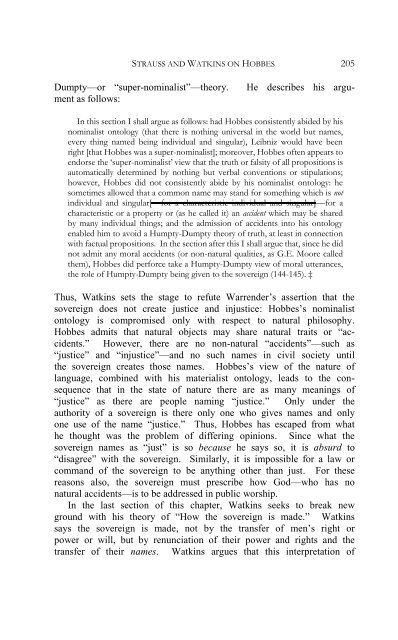Strauss and Watkins on Hobbes' Political Philosophy: A Review
Strauss and Watkins on Hobbes' Political Philosophy: A Review
Strauss and Watkins on Hobbes' Political Philosophy: A Review
You also want an ePaper? Increase the reach of your titles
YUMPU automatically turns print PDFs into web optimized ePapers that Google loves.
STRAUSS AND WATKINS ON HOBBES 205<br />
Dumpty—or “super-nominalist”—theory. He describes his argu-<br />
ment as follows:<br />
In this secti<strong>on</strong> I shall argue as follows: had Hobbes c<strong>on</strong>sistently abided by his<br />
nominalist <strong>on</strong>tology (that there is nothing universal in the world but names,<br />
every thing named being individual <str<strong>on</strong>g>and</str<strong>on</strong>g> singular), Leibniz would have been<br />
right [that Hobbes was a super-nominalist]; moreover, Hobbes often appears to<br />
endorse the ‘super-nominalist’ view that the truth or falsity of all propositi<strong>on</strong>s is<br />
automatically determined by nothing but verbal c<strong>on</strong>venti<strong>on</strong>s or stipulati<strong>on</strong>s;<br />
however, Hobbes did not c<strong>on</strong>sistently abide by his nominalist <strong>on</strong>tology: he<br />
sometimes allowed that a comm<strong>on</strong> name may st<str<strong>on</strong>g>and</str<strong>on</strong>g> for something which is not<br />
individual <str<strong>on</strong>g>and</str<strong>on</strong>g> singular[—for a characteristic individual <str<strong>on</strong>g>and</str<strong>on</strong>g> singular]—for a<br />
characteristic or a property or (as he called it) an accident which may be shared<br />
by many individual things; <str<strong>on</strong>g>and</str<strong>on</strong>g> the admissi<strong>on</strong> of accidents into his <strong>on</strong>tology<br />
enabled him to avoid a Humpty-Dumpty theory of truth, at least in c<strong>on</strong>necti<strong>on</strong><br />
with factual propositi<strong>on</strong>s. In the secti<strong>on</strong> after this I shall argue that, since he did<br />
not admit any moral accidents (or n<strong>on</strong>-natural qualities, as G.E. Moore called<br />
them), Hobbes did perforce take a Humpty-Dumpty view of moral utterances,<br />
the role of Humpty-Dumpty being given to the sovereign (144-145). ‡<br />
Thus, <str<strong>on</strong>g>Watkins</str<strong>on</strong>g> sets the stage to refute Warrender’s asserti<strong>on</strong> that the<br />
sovereign does not create justice <str<strong>on</strong>g>and</str<strong>on</strong>g> injustice: Hobbes’s nominalist<br />
<strong>on</strong>tology is compromised <strong>on</strong>ly with respect to natural philosophy.<br />
Hobbes admits that natural objects may share natural traits or “ac-<br />
cidents.” However, there are no n<strong>on</strong>-natural “accidents”—such as<br />
“justice” <str<strong>on</strong>g>and</str<strong>on</strong>g> “injustice”—<str<strong>on</strong>g>and</str<strong>on</strong>g> no such names in civil society until<br />
the sovereign creates those names. Hobbes’s view of the nature of<br />
language, combined with his materialist <strong>on</strong>tology, leads to the c<strong>on</strong>-<br />
sequence that in the state of nature there are as many meanings of<br />
“justice” as there are people naming “justice.” Only under the<br />
authority of a sovereign is there <strong>on</strong>ly <strong>on</strong>e who gives names <str<strong>on</strong>g>and</str<strong>on</strong>g> <strong>on</strong>ly<br />
<strong>on</strong>e use of the name “justice.” Thus, Hobbes has escaped from what<br />
he thought was the problem of differing opini<strong>on</strong>s. Since what the<br />
sovereign names as “just” is so because he says so, it is absurd to<br />
“disagree” with the sovereign. Similarly, it is impossible for a law or<br />
comm<str<strong>on</strong>g>and</str<strong>on</strong>g> of the sovereign to be anything other than just. For these<br />
reas<strong>on</strong>s also, the sovereign must prescribe how God—who has no<br />
natural accidents—is to be addressed in public worship.<br />
In the last secti<strong>on</strong> of this chapter, <str<strong>on</strong>g>Watkins</str<strong>on</strong>g> seeks to break new<br />
ground with his theory of “How the sovereign is made.” <str<strong>on</strong>g>Watkins</str<strong>on</strong>g><br />
says the sovereign is made, not by the transfer of men’s right or<br />
power or will, but by renunciati<strong>on</strong> of their power <str<strong>on</strong>g>and</str<strong>on</strong>g> rights <str<strong>on</strong>g>and</str<strong>on</strong>g> the<br />
transfer of their names. <str<strong>on</strong>g>Watkins</str<strong>on</strong>g> argues that this interpretati<strong>on</strong> of
















